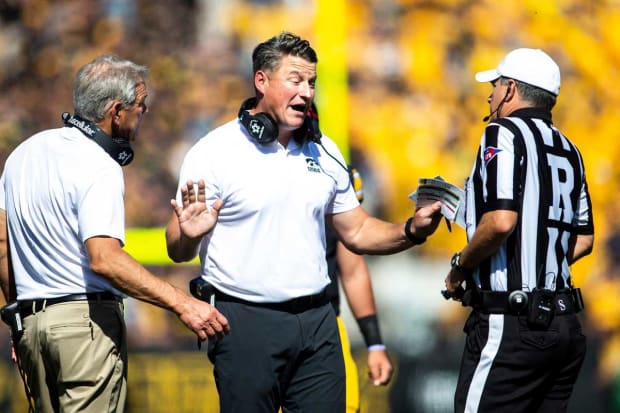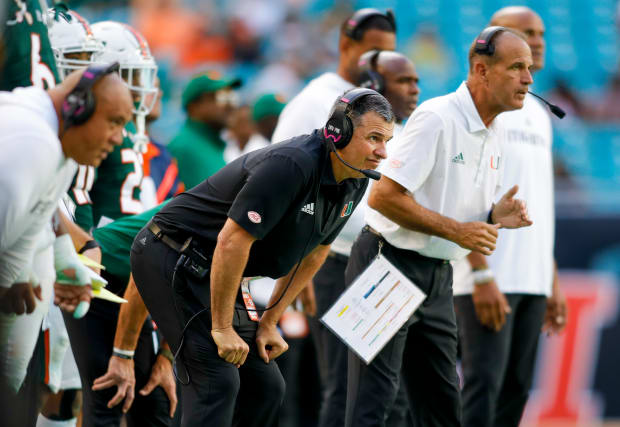Forty names, games, teams and minutiae making news in college football, where a problem at long snapper can lead to a four-safety calamity:
First Quarter
Congrats, You’re Stuck With Him
The biggest administrative failure in college football has been losing control of the coaching contract market, and the repercussions of that failure are rampant right now in the sport. Bulldozed by agents into huge buyouts, doling out extensions for modest achievement and susceptible to anxiety over losing recruits if the coach isn’t locked up in a long-term deal, athletic directors have been leveraged to the hilt.
Many of those ADs are tied to underperforming coaches who are too expensive to get rid of and/or too powerful to force into making changes. One way or another, the bills are going to come due. The Dash list of coaches who aren’t living up to their contracts, but probably aren’t going anywhere:
Jimbo Fisher (1), Texas A&M. The contract: 10 years, $95 million, signed in Sept. 2021. The current buyout: roughly $86 million if fired this year, with no offsets should Fisher take another job. The on-field product: The Aggies are, pound-for-pound, the biggest disappointment in the country this season. After starting the year ranked fifth in the nation, they’re 3-4, winless in true road games and owning a home loss to Appalachian State.
The nation’s No. 1 recruiting class has had some contributions, but for the most part is too young to make an impact. The offense—Fisher’s specialty—is a train wreck. Texas A&M is last in the SEC in scoring (21.9 points per game) and 13th in yards per game (342.7). The Aggies haven’t scored more than 24 points against an FBS opponent since exactly a year ago, in a win over South Carolina. Losing to the Gamecocks Saturday pushes them toward a potential losing record, something that last happened at A&M in 2009. Fisher’s record in his fifth season is worse than Kevin Sumlin’s at the same point, and Sumlin was fired in year six.
If forcing Jimbo out isn’t an option—even at a place with a lot of stupid money, this would be excessive—forcing him to give up play calling has been a suggested remedy (2). Fisher has been accused of running an obsolete offense, and there certainly do not seem to be many easy plays at the Aggies’ disposal. Everything is laborious. And every game this month has been a loss.
Kirk Ferentz (3), Iowa. The contract: Eight years, $56 million, announced in January. The current buyout: reportedly $6 million for the remaining length of the deal, which would be $42 million after this season. The on-field product: It’s not just that the Hawkeyes are bad (they’re 3-4 and possibly headed for their first losing season in a decade), it’s how incredibly bad they are on the side of the ball coordinated by Brian Ferentz (4), Kirk’s son.

Joseph Cress/Iowa City Press-Citizen/USA TODAY NETWORK
Iowa is the worst offensive football team in the country, 131st out of 131, averaging just 227.3 yards per game. To date, 22.5 percent of its points have been scored by an outstanding defense—three touchdowns and two safeties. Through this dismal season, Team Ferentz mulishly refused to bench quarterback Spencer Petras, a three-year starter whose performance keeps getting worse. (He’s last by a long shot in Big Ten pass efficiency.) Finally, trailing No. 2 Ohio State on the road Saturday, the coaching braintrust relented and inserted backup Alex Padilla. He fumbled his first snap and threw an interception on his first pass (which did less to justify Team Ferentz’s refusal to bench Petras than it did to condemn their quarterback development).
Kirk Ferentz’s long and successful tenure at Iowa has become corrosive of late, almost an abuse of power as he surrounded himself with yes men, friends and family. The Brian Ferentz situation is particularly egregious, a clear case of nepotism that the school has slinked around by having Brian report to athletic director Gary Barta instead of his father. At other schools where the offense is tanking (Rutgers, Indiana, Boise State), in-season assistant coaching changes have been made. At Iowa, the family business lurches on, no matter how bad the results. The fan base deserves better.
Brent Venables (5), Oklahoma. The contract: six years, $43.5 million, agreed to in late 2021. The buyout: the deal is fully guaranteed, so Oklahoma would have to pay him $36 million if it fired him after this season — extremely unlikely in general, but especially so at that price. The on-field product: The Sooners (4-3) were effectively eliminated from Big 12 championship contention by mid-October after losing their first three league games. This is the first time since 2014 that Oklahoma has lost more than two Big 12 games in a season.
The mind-blowing thing here is that Venables was given a fully guaranteed six-year contract (and a salary of more than $7 million annually) without ever having been a head coach. He’s been sought after for years and built up a rock-star defensive coordinator reputation, but this was a massive leap of faith by Oklahoma that thus far (and yes, it’s early) has not been rewarded. Agent Jimmy Sexton had AD Joe Castiglione where he wanted him in negotiations: blindsided by the departure of Lincoln Riley and desperate to land a replacement with some cachet. Castiglione paid up.
For $7 million a year and a fully guaranteed deal, you’d like to think your new coach could keep within 48 points of rival Texas. Didn’t happen. For now, Oklahoma fans are happy to blame it all on predecessor Riley, but that excuse has a short shelf life at a blueblood program.
Steve Sarkisian (6), Texas. The contract: six years, $34.2 million, signed in February 2021. The buyout: 70 percent of what’s remaining on the deal, which after this season would be about $15.7 million. The on-field product: After losing to Oklahoma State Saturday, the Longhorns remain Not Back. They are 5-3 overall, 3-2 in the Big 12, and remain on the outside of the conference championship race looking in. Sark is 10-10 overall, which is three games worse than Tom Herman was at the same stage of his Texas tenure.
Compared to what Texas spent to fire Herman and his staff and then hire Sark and his staff, a buyout of less than $16 million almost sounds reasonable. Of course, it would also be accompanied by paying the next coach a ton, and it would keep the Longhorns in their current spin cycle of lavish spending for middle-class results. Sark will assuredly stay onboard for another season, if for no other reason than to make sure Arch Manning arrives on campus in 2023, but the fact remains that UT brass spent a lot of money to hire a guy who never won more than eight regular-season games at two great jobs (Washington and USC). That trend stands a solid chance of continuing for a second season at a third great job.
Mario Cristobal (7), Miami. The contract: A reported 10 years, $80 million, agreed to last December. The buyout: Unknown. The on-field product: The Hurricanes are quite bad in year one under Cristobal, currently 3-4 with home losses to Middle Tennessee State and Duke. Their wins are over Bethune-Cookman, Southern Mississippi and a Virginia Tech team that is 2-5. And quarterback Tyler Van Dyke went down with an injury in the blowout loss to the Blue Devils Saturday.
Miami overpaid to bring Cristobal home, a classic nostalgia hire of an alum who played during the program’s glory days. It’s gone badly enough that Cristobal hit the Buy In Or Go Away button Saturday after the loss to Duke. “If someone’s not playing hard, they have to go play somewhere else,” he said. “What we have to do requires tough people. To turn a program, rebuild it, it requires tough-minded people willing to do the work. If that shows up on tape, they have to find somewhere else [to play].”

Sam Navarro/USA TODAY Sports
The first-year contrast to Cristobal was on the opposite sideline Saturday. Duke coach Mike Elko (8) is 5-3 at a program that won five games the previous two seasons combined. The Blue Devils’ three losses are by a total of 14 points, and they likely will be favored in their next two games. Elko’s salary is unknown at Duke, a private school that doesn’t have to divulge contract details, but it’s safe to assume he isn’t getting $8 million a year.
Mel Tucker (9), Michigan State. The contract: 10 years, $95 million, agreed to in November 2021. The buyout: fully guaranteed, which makes firing him untenable unless billionaire alum Matt Ishbia wants to fund it all himself. The on-field product: The Spartans are 3-4, with the losses coming consecutively by a combined margin of 81 points. Michigan State bounced back with a win over Wisconsin Oct. 15 but still figures to be an underdog in at least three of its final five games (starting with a visit to rival Michigan Saturday).
If Michigan State checks in a 5-7 when all is said and done, it would be Tucker’s third losing season in four as a head coach. The 11-2 smash success of 2021 would appear to be more the outlier than the norm. But if he can beat Jim Harbaugh and Michigan for a third straight season Saturday, it would certainly lessen the buyer’s remorse for Spartans fans.
Penn State’s 41-17 blowout loss to Michigan earlier this month was Franklin’s sixth loss in nine games against the Wolverines, and he’s 1-7 against the Buckeyes, who come to State College this week. The Nittany Lions are most of the way out of the two-year malaise that gripped them in 2020 and ’21, when their record was 11-11, but they’re still not a serious contender to win the Big Ten (unless things change dramatically against Ohio State Saturday). Nevertheless, Penn State is tied to Franklin for the foreseeable future, although his side of the buyout to leave the school reduces from $8 million to $6 million to $2 million from 2022-24. For the school to make a unilateral decision to part ways from Franklin would cost a fortune.







